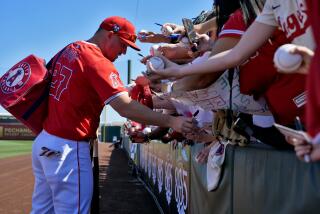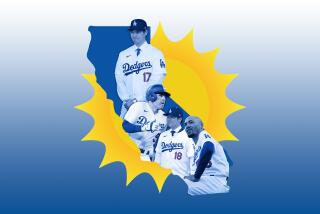Angels enter a home stretch
The Angels’ three-game sweep of Seattle this week was pivotal, and their four-game series against the Mariners in Anaheim on Sept. 20-23 could be crucial.
But there is a very good chance the American League West championship could be determined more by these next 10 days, when the Angels and Mariners are three time zones apart, than by any head-to-head battles between the teams.
While the Angels will be luxuriating in the comforts of home, where they have a major league-best 44-20 record, the Mariners will travel to Toronto, New York and Detroit.
The Angels open a three-game series against Texas tonight, followed by three games against Oakland, both teams with losing records. AL Central leader Cleveland is in town for four games beginning next Thursday.
The Mariners, who lost a makeup game in Cleveland on Thursday, will play three games against a Blue Jays team that has been tougher at home (39-27) than on the road (28-39), three against the red-hot Yankees and three against a dangerous Tigers team scrapping for a playoff berth.
The Angels lead the Mariners by 5 1/2 games, and if they have another strong homestand and Seattle stumbles on the road, the Angels could open an eight- or nine-game lead entering the final three weeks of the season.
An insurmountable deficit? No. One the Mariners probably would overcome? No, not when you consider 17 of Seattle’s remaining 30 games are against teams with winning records, while the Angels play 21 of 29 games against teams with losing records.
“We need to play .500 or better,” Mariners Manager John McLaren said of the trip. “We’re playing the teams we have to beat. As the season goes on, [the clock] is ticking. We know that. We’re looking for a big trip, which we’re capable of.”
The Angels’ focus, as usual, is internal. Since his teams began winning titles five years ago, Mike Scioscia has repeated the same pennant-race mantra so often it has turned into a running joke between the manager and reporters covering the team: It’s not who you’re playing or where you’re playing, it’s how you’re playing.
“We’re still not looking at the standings,” Scioscia said. “There’s still a lot of baseball left, and our task right now is to take it game by game, to bring our game onto the field every night. The standings will be our report card at the end, but you don’t want anything filtering in now that’s a distraction. We know we have to play well to reach our goal.”
Their best baseball this season has come in Angel Stadium. The Angels are hitting .309 and averaging 5.9 runs a game, and their pitchers have a 3.71 earned-run average at home.
They are 35-34 on the road thanks to their Safeco Field sweep this week, but even after overwhelming the Mariners for three games, they are hitting .263 and averaging 4.4 runs a game, and their pitchers have a 4.53 ERA on the road.
“We were really pathetic on that first road trip,” Scioscia said of the Angels’ 1-7 swing through Milwaukee (to play Cleveland), Boston and Oakland. “I hate to keep going back to that, but we could easily be [more games] over .500 if we had played at a higher level. Some years we’ve done as well on the road as at home. Two years ago, we played better on the road than at home.”
Most teams play better at home -- 20 of 30 major league teams have winning records at home -- but the Angels’ extreme home-road splits, both in records and statistics, defy logic.
Erratic starter Ervin Santana has been a factor -- he’s 4-3 with a 3.94 ERA at home and 1-9 with an 8.72 ERA on the road.
But unlike the Yankees, who load up on left-handed power hitters who can reach the short right-field porch in Yankee Stadium, and the Red Sox, whose hitters know how to use quirky Fenway Park and its Green Monster in left field to their advantage, the Angels aren’t tailored to any particular stadium.
They don’t rely on power -- they rank 13th in the league in home runs -- and their superb situational hitting, aggressive baserunning, top-notch pitching, both in the rotation and bullpen, and sound defense seem suited to win in any park.
Several players have cited strong fan support; Angel Stadium is sold out most nights, and Angels fans have even had some success drowning out Yankees and Red Sox fans when those teams are in town.
There is a certain comfort in familiar surroundings, especially for pitchers on their home mounds, one that helps players feel more relaxed, at ease.
“Maybe you eat better at home, maybe it’s sleeping in your own beds, maybe it’s the home crowd,” third baseman Chone Figgins said. “I don’t know what it is.”
Rather than analyzing it and searching for ways to explain it, the Angels prefer to just ride it.
They trail Boston by a half-game for the best record in baseball, and if they finish with the league’s best record, they would have home-field advantage throughout the playoffs, which could loom large in Fenway Park, a stadium the Angels struggle in.
“They call it home-field advantage for a reason,” center fielder Gary Matthews Jr. said. “They always say if you play .500 on the road and win series at home, you should get to the playoffs. I’d love to be 10 games over .500 on the road, but that’s not always the way it goes.”
Bartolo Colon, on the disabled list because of an elbow irritation, gave up three runs and six hits in five innings of a rehabilitation start for triple-A Salt Lake on Thursday night, striking out four and walking one against Fresno.
Colon threw 69 pitches, 44 for strikes, and his fastball reached 95 mph. The right-hander, who threw four scoreless innings before being tagged for three runs in the fifth, is expected to make one more rehab start before being activated.
--
(BEGIN TEXT OF INFOBOX)
Anderson’s summer surge
Garret Anderson’s recent 10-RBI game brought him plenty of attention, but the Angels outfielder has been hot for much longer than one night. Since the All-Star break, Anderson has 41 RBIs, third in the majors through Wednesday. It seems as if the more runners the Angels get on, the more Anderson knocks in. His averages with runners on base since the All-Star break:
*--* RUNNERS AVG. H/AB One 244 10 for 41 Two 353 12 for 34 Three 600 3 for 5 *--*
Anderson has always handled inside pitches best -- even better than pitches left over the middle of the plate. And since the break, pitchers seem to have had the right idea when facing him, offering an inside strike only 28% of the time. But throughout his scorching second half, he has repeatedly shown pitchers it is best to stay out of his kitchen completely.
*--* Inside Middle Outside 2005 to 2007 332 314 223 Since All-Star break 471 333 185 *--*
Source: Inside Edge Scouting Services
More to Read
Go beyond the scoreboard
Get the latest on L.A.'s teams in the daily Sports Report newsletter.
You may occasionally receive promotional content from the Los Angeles Times.






